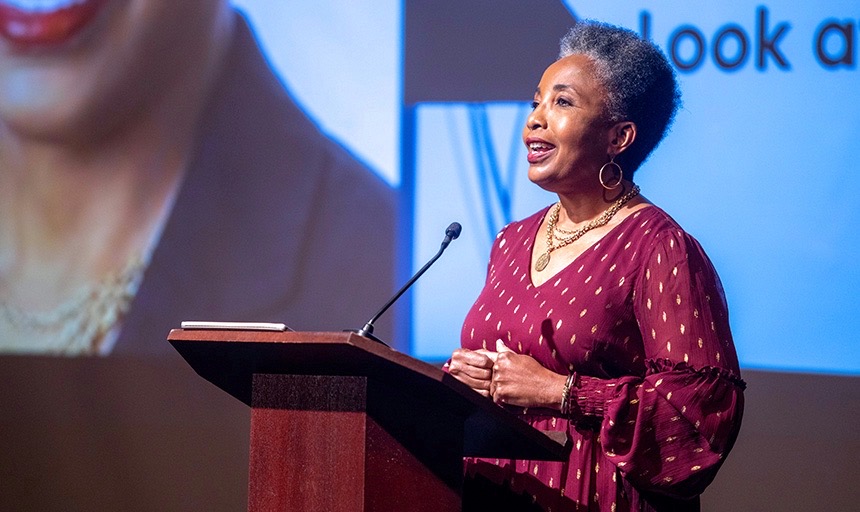
On April 1, Roanoke College’s Center for Economic Freedom hosted Carol Swain ’83 for a well-attended talk, “What My Life Has Taught Me About DEI in America.” Co-sponsored by David L. Guy `75 and the Young America's Foundation, the event reflected on Swain’s path from an impoverished childhood in rural Virginia to the highest levels of academia as well as her analysis of what she concluded were flawed diversity, equity and inclusion initiatives. Swain's talk was broadcast by C-SPAN and can be viewed here.
Swain also made time to talk with current students during her visit, including Bryana Archer ’26, an honors student and an assistant with the Center for Economic Freedom. Excerpts of their conversation and more about Swain’s life journey follow below.
By Bryana Archer ’26
Carol Swain ’83 is a force of nature who’s defied many odds. Her life story is one of hard work, a refusal to give up and a dedication to education.
She started her education journey at Virginia Western Community College, earning an associate's degree, before continuing to Roanoke College.
All she ever hoped for as a young student was to get a better job and to graduate with honors — a goal she realized as a Maroon, receiving her bachelor's degree with magna cum laude distinction.
But she didn’t stop there. She went on to earn a master’s in political science at Virginia Tech, a doctorate in political science from UNC at Chapel Hill and a master’s in the studies of law from Yale University.
Swain’s education took her to professorships at Princeton University, where she obtained early tenure, and Vanderbilt University, where she was a full professor of political science and law.
Throughout her career, she has authored or edited 12 books. She’s appeared as a commentator on CNN, ABC News, BBC, C-SPAN, Fox News and more. She’s also the founder and CEO of Carol Swain Enterprises, REAL Unity Training Solutions and Your Life Story for Descendants. In 2011, she created a nonprofit, Be the People Project, with the mission of helping shape American culture and advancing public understanding of conservative values.
Today, Swain is a senior fellow for the Institute for Faith and Culture, as well as a proud mother, grandmother and great-grandmother.
Q: While studying your work before this event, I was fascinated by your dedication and passion for what you do. What drives that passion? Is it a goal or a hope for the future?
When I was at Roanoke, my passion and my goal was to complete my education so that I could get a good job. I knew it was important for me to distinguish myself. That was one of the reasons why I made it a goal before I even started to be an honors student.
I checked out books on how to make A’s in college, how to take essay exams and objective tests. And I applied those principles. So, I was very focused on excelling from an early point because I knew it would pay off in the long run.
Q: You’re a prolific writer who has authored or edited 12 books. Do you have a favorite book among those? Is there one that you recommend people read first?
My favorite is "Be the People: A Call to Reclaim America's Faith and Promise” because it was the first book where I decided I was going to write for the general population. I was tired of writing for political scientists, and I felt like I wanted to write for real people. I wanted the American people to be able to understand what was taking place in the country.
If you’re interested in DEI, I would recommend you read "Black Eye for America: How Critical Race Theory is Burning Down the House." If it's someone who’s a Christian believer — either a new believer or someone struggling with the culture and how to live out your Christian walk in this world that can be so confusing — I recommend "Countercultural Living." That was my first book written for a Christian audience.
Q: You’ve served as a professor at prestigious universities, had presidential appointments and been cited by the U.S. Supreme Court three times. Those are all amazing feats. What do you consider your biggest accomplishment?
Finding my voice. And I say finding my voice because I was shy most of my life, including while I was at Roanoke College and while I was at Princeton. Then I had a Christian conversion experience, and that freed me because I stopped caring and being crippled by what others may say or think, or whether they would laugh at me because of my accent. I was very much aware of my accent.
I was very much aware of coming from the underclass and those markers that people pick up on. I think that’s what kept me silent. But I think finding my voice is my most important accomplishment, and the Christian conversion experience is what gave me that voice and gave me courage.
Q: I’m personally also interested in what got you to start your business, Your Life Story for Descendants. I love history and unique life stories, so that struck me as a particularly interesting business and project.
It’s a new business I started last year. The man who owns the beautiful building I rent my office in, he has all these pictures and mementos on the wall behind him. There was a telegram and a picture of a man, and I asked him about the telegram. He said, "It was the telegram my mother sent my father in the military the night I was born." There’s a part of a city called Brentwood, Tennessee, where his family owned a lot of land that has since been developed. But he has pictures of it before it was developed, when it was farmland.
I asked him if he had told his story. How was he going to pass his story along? He hadn’t thought of it. If you were to go to the Your Life Story for Descendants website, I show part of his story and video on there.
It’s about preserving your story for your family. You can leave money behind for your family, but you can also leave your story. And the story may be more powerful. So that’s my whole thing: Leave your story.
Q: Tell us a little about your time at Roanoke College. How do you think your experience here helped set you on the path that would take you so many amazing places?
What happened for me at Roanoke College is that I built up a lot of self-confidence. Because, you know, this was not Virginia Western anymore. This was Roanoke College, with new competition. And I excelled here.
Dr. C.W. Hill was significant in my life. He was my advisor. He told me at my first session not to expect to do as well as I had done at Virginia Western. I already knew in my head I was going to be an honors student at Roanoke College, so it was like throwing the gauntlet down. He had high standards. But he also encouraged me and supported me over the years.
Q: What advice do you have for current students at Roanoke?
Don’t follow the crowd. Be willing to challenge yourself by exposing your mind to divergent views. In this era of political correctness and safe spaces and trigger warnings, I am a conservative. I don’t know if I would be a conservative if I hadn’t been exposed to new ideas in my education.
At Roanoke College, in Dr. Hill's courses on political science and public policy, I got to read some conservative thinkers like Thomas Sowell, Edward C. Banfield and Milton Friedman. I got introduced to people whose work I would not have read otherwise, and I learned critical thinking skills that have served me all of my life.
It takes a little bit of courage to stand up and think outside the box. But at the end of the day, I think the world changers, hopefully, will be those that think outside the box.
Be the People
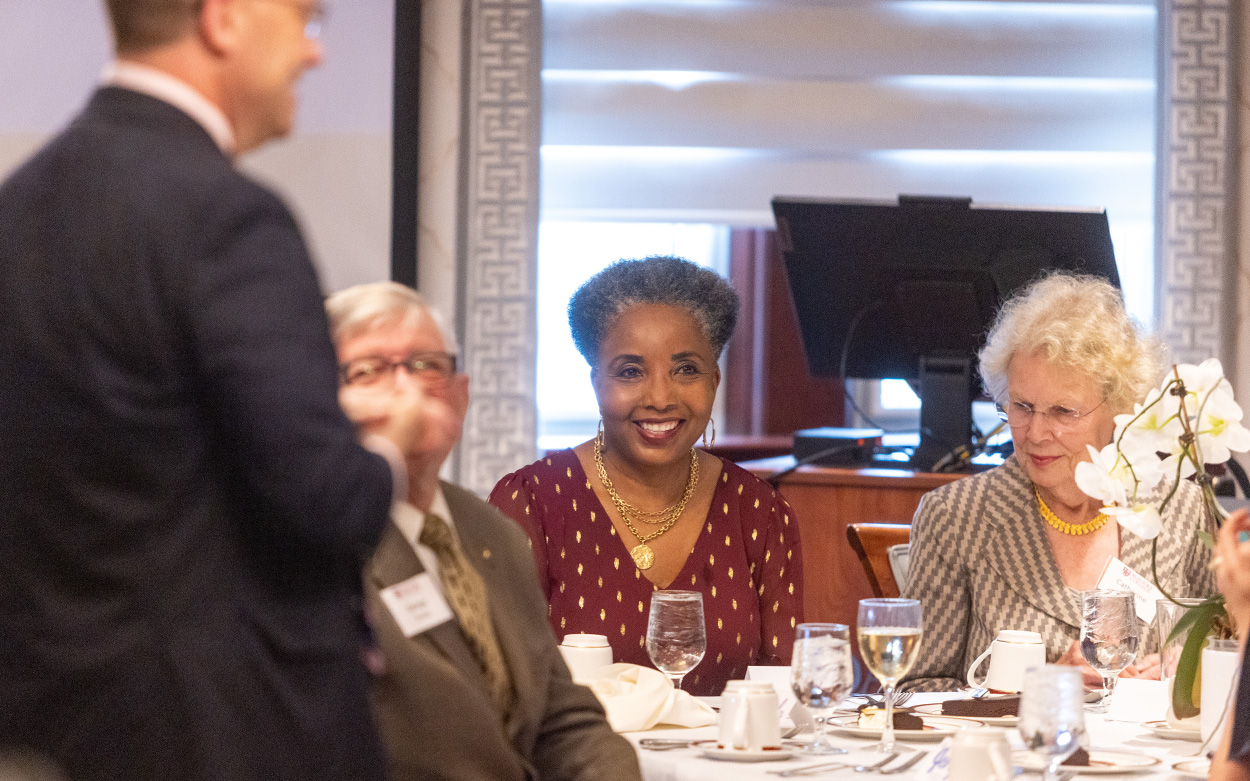
As part of her return to her alma mater, Carol Swain was the guest of honor at a reception attended by Roanoke College leaders, faculty, students and community members.
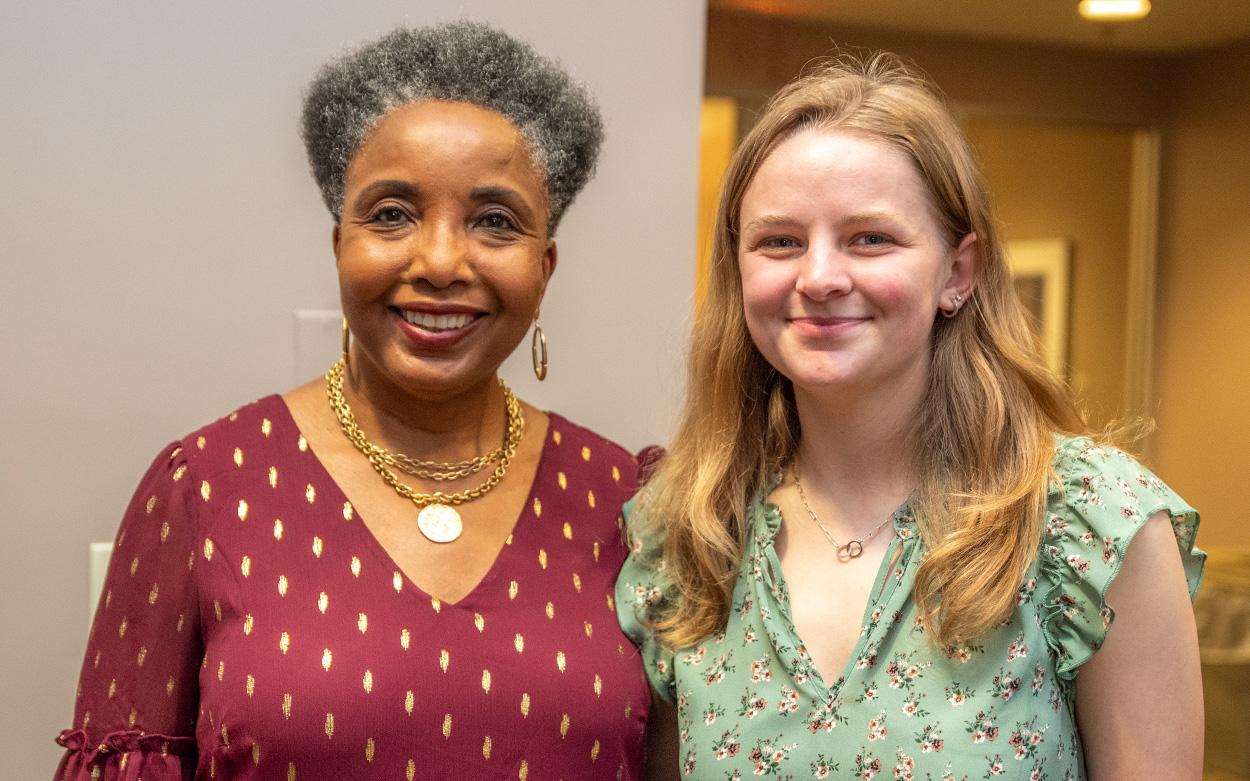
Carol Swain and Bryana Archer '26 spoke for a wide-ranging Q&A about Swain's life and accomplishments.
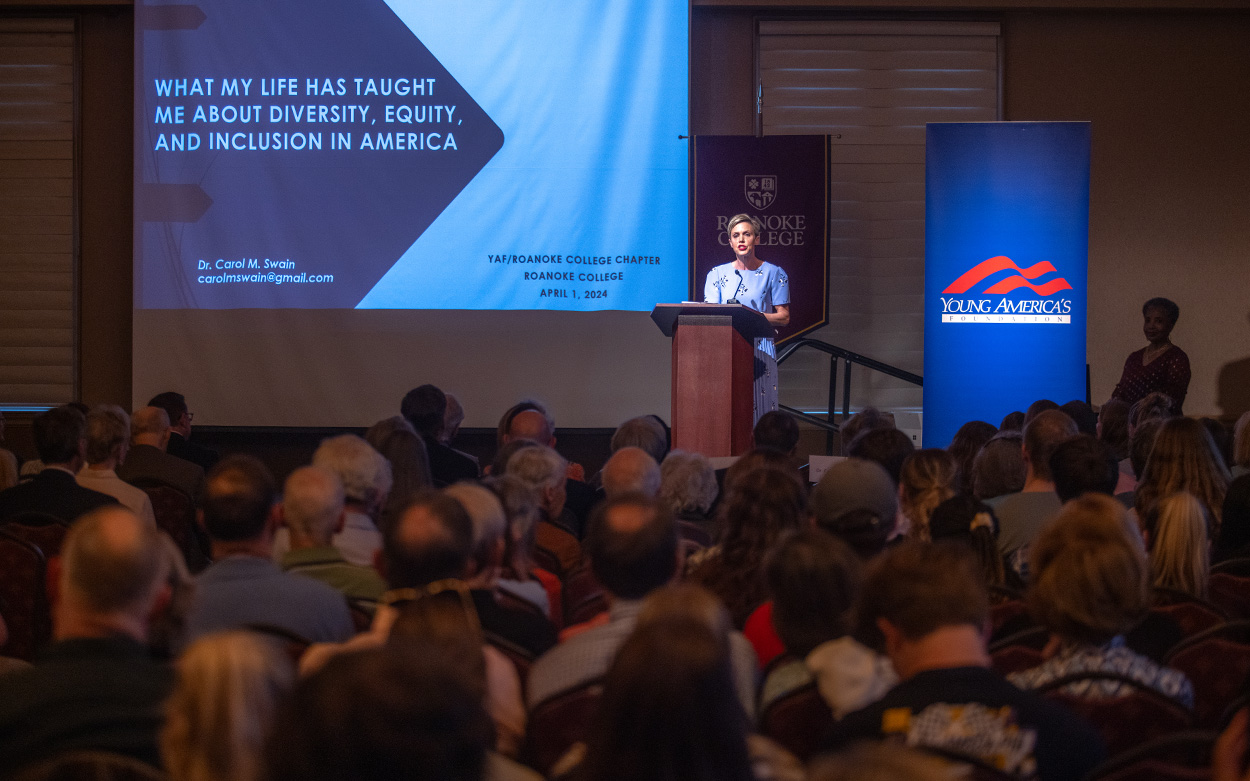
Alice Kassens, director of Roanoke College's Center for Economic Freedom, greeted audience members at Carol Swain's lecture in the Wortmann Ballroom.
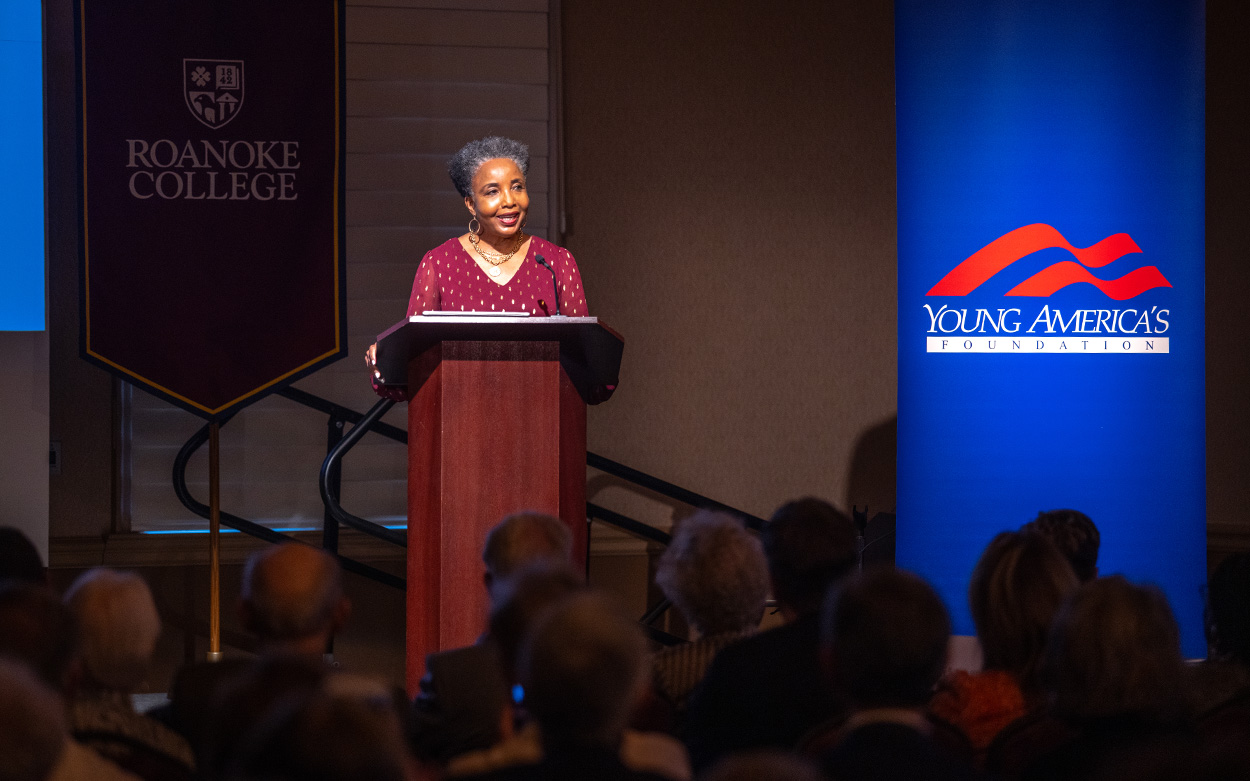
Carol Swain, who grew up in rural Virginia, now lives in Nashville but said she still considers the commonwealth to be her home. "It is so good to be home," she said at the outset of her talk.